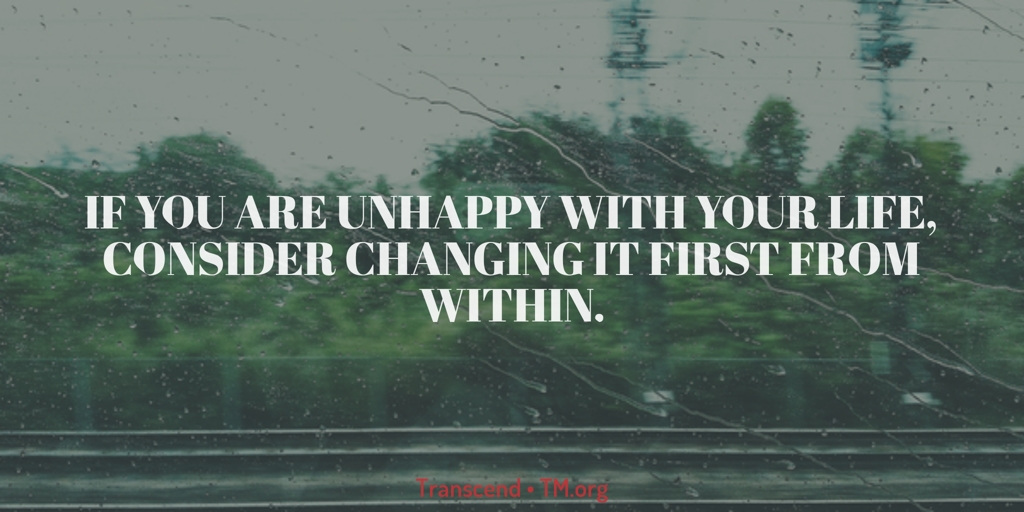When adversity strikes, meditation can be our best friend. Not as an escape, but as a secret weapon to fortify our minds and bodies, to create resilience and perspective. In his book, The Gift of Adversity, world-renowned researcher, psychiatrist and author Dr. Norman Rosenthal tells us, “If you are unhappy with your life, consider changing it first from within. Meditation is a powerful tool for self-change, which often leads naturally to positive changes in those around you.”

Here are three ways that an ancient meditation practice is helping people overcome adversity in modern life.
1. Mind Over Matter: Reversing the Stress Response
When we are under stress from crisis, disappointment, loss or sudden illness, our bodies react by flooding our nervous systems with stress hormones, making it harder to think clearly, sleep deeply or have the wherewithal to pick up the pieces. As a teacher of the Transcendental Meditation technique, I meet many of my students for the first time when they are going through a difficult period and are looking for inner strength to overcome adversity.
“TM can be a tool that anchors us to the inner side of life, the side that is beyond the ups and downs of change, that is eternal, timeless and untouched.” One might think it would be difficult to sit and meditate while feeling troubled, but the beauty of a natural, effective meditation technique is that it allows the mind to shift, within seconds, to a state of calm and peace. Research has found that deep transcendence is accompanied by reduction of breath rate, slowing of metabolic rate, decreased cortisol and plasma lactate and increased skin resistance are all indicators of deep relaxation.
How often I’ve witnessed meditators achieve a new calm and confidence to face their challenges. I see this especially with those fighting cancer. One of my students recently shared:
“During my MRI, I was told that for the 30 minutes of the procedure it was imperative that I not move a muscle. If you’ve ever had an MRI, you know what it sounds like — as though the capsule is being bombed by some alien force. So, what did I do? I meditated. Without that skill, I honestly think I would’ve completely freaked out. With meditation, it was a piece of cake.”
2. The Eye of the Hurricane: Calming the Emotions
Fear, anxiety, anger and depression can paralyze us at a time when we need to take action and deal with adversity. Often our ability to find a solution depends on gaining distance from the problem. Transcendental Meditation allows us to go beyond the state of agitation and obsessive thoughts to a state of inner peace and steadiness.
Meditation may not necessarily provide answers during the session — and it doesn’t have to. Meditators report that the deep coherent rest of meditation washes away stress, increases inner wakefulness and harmonizes emotions. Afterward, we feel a burden has lifted and we can more confidently navigate difficult waters.
3. Seeing the Big Picture
When caught up in the storm, it’s easy to blame others or circumstances — easy to feel fear, resentment, and confusion. The best answers come from our own inner truth, that tender level of intuition from where we can see the bigger picture, admit our fault, forgive others, and maybe even find the blessing in disguise.
Meditators discover that the mind is infinitely creative, expansive, and intuitive at its deepest, most silent level. Transcendental Meditation can be a tool that anchors us to the inner side of life, the side that is beyond the ups and downs of change, that is eternal, timeless and untouched. Yes, in our outer lives we need to behave and act responsibly in the face of adversity, but by regularly retreating to our innermost selves, we gain reinforcement and clarity.
In The Gift of Adversity, Dr. Rosenthal emphasizes that figuring out why adversity strikes is less important than how we deal with it — and most important are the lessons learned. As a meditator himself, Dr. Rosenthal offers an expanded, insightful, uplifting perspective. Every chapter of his book is a jewel of wisdom extracted from his own life experiences as well as the experiences of others, and he beautifully ends each chapter with a sutra-like summation. I’d like to have them all as magnets on my refrigerator! Here are some of my favorites:
“Look within to gauge your worth rather than depending on institutions or the opinions of others, for institutions rise and fall, and fashions come and go, but a good sense of your own value will see you through life’s ups and downs.” “Try to use difficulties, setbacks, and imperfections as a stimulus to creativity whenever they arise. When you feel trapped, like a fly bumping against glass, look for a novel solution. Fly some other way!” “Whether you confront them aggressively or gently, it is important to face your fears. By ignoring them, you increase the risk that trouble will come when you least expect it and are least prepared to deal with it.” “Look deeply into what makes you different. Understand that difference and develop it, for it may be your greatest contribution.”
Originally posted on the Huffington Post Blog.




